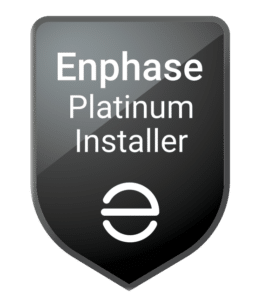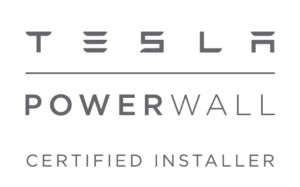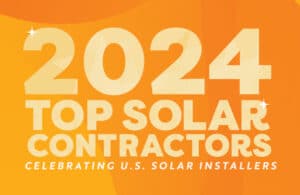Going solar FAQs
Thinking about going solar? we’ve answered the most common questions about solar here in massachusetts.
Solar 101
A photovoltaic (PV) cell converts the energy from light (photo) to electrical (volt) in one step. The way the cells do this trick is complicated and it depends on the type of cell technology. But it can be thought of this way: as light is absorbed by the cell, a light wave kicks an electron up an electrical hill. This electron now has more energy since it can drop back down the hill later.
A solar panel is made from many such cells, each of which has many electrons that have been kicked up the hill. These cells are all connected together and it adds up to a lot of electrons ready and waiting to fall back down that hill. So the photovoltaic panel is kind of like a big battery, with one side having electricity wanting to get to the other side. So there’s the power, but how is it changed from “a big battery thing” to the kind of electricity you can use to power a house? That’s the job of a gadget called an inverter.
Yes, according to a recent study at the Florida Solar Energy Center at the University of Central Florida. They analyzed solar power capability throughout the United States. The results shown on this map indicate that the Southwest is the optimal location, but Massachusetts has 88% of the solar capacity of central Arizona! If it is hard to believe, consider this fact: modern solar technology is more efficient when it is kept cool. Our cool climate and summer sea breezes actually make electricity production soar!
A grid-tied electrical system produces alternating current (AC) which is fully compatible with the electricity supplied by the power company. So during times when your electrical needs surpass your system’s production, the additional electricity flows to you from the grid and your meter counts forward as normal. However, when your system produces more than your electrical needs, you supply power back to the grid and your meter counts backward. At the end of the month, you only pay for the difference (this is called net metering).
This lets you produce, and get credit for, as much energy as possible without having to worry about solar batteries or other storage systems. It’s a clean, easy, and efficient way to generate your own power. Think of it as, “What you don’t use, you automatically sell to your neighbors!”
Net metering allows you to earn a credit on your monthly electricity bill for excess electricity that your solar panels produce. The excess energy goes back to the power grid, and the credit can be used when you need electricity and your solar panels can’t keep up in real time, like at night or when it’s cloudy.
This lets you produce, and get credit for, as much energy as possible without having to worry about solar batteries or other storage systems. It’s a clean, easy, and efficient way to generate your own power. Think of it as, “What you don’t use, you automatically sell to your neighbors!”
A photovoltaic (PV) solar panel converts the light energy to electrical direct current (DC) energy, but the electrical power in your house is alternating current (AC). The inverter gets its name for the way it takes a direct flow of electricity and flips it up-side-down then back up-right. It does this in a nice smooth wave exactly 60 times every second. It’s the electrical equivalent of converting a river flow of water into waves; rivers and waves both have energy, just a different way of delivering it. Modern inverters are very sophisticated devices. They typically have 95% or better efficiency, they can report how much power they are converting, and they are reliable and maintenance-free. My Generation Energy uses micro-inverter technology, where each panel has a dedicated inverter. This delivers optimal performance of the entire system and provides pinpoint reporting of electricity production. Click here to learn why we recommend micro-inverters.
Beyond the fact that both receive energy from the sun, the two types of solar energy systems are completely different.
Solar hot water systems collect radiation from the sun to heat a food-grade glycol fluid inside collectors mounted on a roof. This heated fluid is circulated and exchanges heat into a holding tank. The holding tank feeds solar-heated water into your domestic hot water system.
Solar electric systems convert sunlight directly into electricity. This electrical energy is then converted to be compatible with your utility service. It is then interconnected to your existing electrical system to reduce the amount of electricity that you need to purchase from your utility.
My Generation Energy is a local solar company that services much of eastern Massachusetts, including Cape Cod and the Islands, Greater Boston, South Shore, and South Coast. If you live in or around Falmouth, Duxbury, Hingham, Chatham, Dartmouth, Westport, or Plymouth, you’re very likely in our service area! Unsure if your town, city, or neighborhood is covered? Give us a call at 508-694-6884 and we’ll help you find a solar solution for your home or business.
Solar Incentives & Financing
The cost of a residential or commercial solar energy system depends on many variables, such as your individual demands for electricity, your available roof or ground space, and also the investment that you’re looking to make into owning your own renewable energy power source. A free solar site assessment allows us to discuss with you what makes the most sense for your needs, so we can help you achieve your goals of going solar and give you an accurate estimate. Contact us today to schedule your assessment!
The federal solar tax credit, officially called the solar Investment Tax Credit, is probably the most well known solar incentive available in the United States. This is likely because of the size of the potential savings! Owners of residential solar and commercial solar energy systems who install their solar panels are given a federal tax credit equalling a percent of their total solar installation costs. There is no cap on the maximum credit allowed, and you are also allowed to roll forward any remaining balance into the next tax year if your tax credit exceeds the total amount of federal taxes due.
This solar incentive has been extended at 30% through 2032; will step down in 2033 and be eliminated for residential in 2035.
While the federal solar tax credit is available in every state, including Massachusetts and Rhode Island, there are also a number of solar incentives exclusively available to Massachusetts home and business owners, including the Solar Massachusetts Renewable Target (SMART) Program, which actually pays you a set incentive rate for the solar energy your panels produce. The rate is guaranteed for a set period of 10-20 years, and the sooner you sign up, the higher your SMART payment.
Massachusetts also offers:
- A state income tax credit of 15%, with a maximum of $1,000, on residential solar installation
- Net metering, when you are given a credit on your electric bill for the excess energy generated by your panels
- MassSave’s Connected Solutions program, which offers incentives for solar battery use
- Local property tax and sales tax exemptions
- Federal MACRS Depreciation for commercial solar
Indeed, solar incentives can come and go. However, once your solar energy system is installed, most of the incentives are received within the first year. You are locked in. Even the longer-term incentives, such as the Solar Massachusetts Renewable Target (SMART), are secure for a term of at least 10 years. How much do you stand to save by upgrading to solar? Learn more about the financial benefits of solar and talk to our team, who can walk you through your electricity usage and how long it would take for you to recoup your solar panel installation costs.
Homeowners or business owners who don’t have enough upfront cash to cover the entire cost of solar installation often have to choose between a solar loan and a solar lease.
With solar loans, you’ll benefit from the full value of your solar energy production. By owning your own solar, you’ll have the greatest return on your investment and benefit from state and federal solar incentives.
Under a solar lease, you won’t own your solar energy system, and therefore you won’t qualify for federal and local solar tax credits (which are some of the biggest savings). Leasing solar panels can also turn selling your home into a headache and can scare off buyers, and most monthly solar loan payments tend to be lower than those for leases.
Solar Batteries
Adding solar battery storage helps you maximize the benefits of your solar energy system. Not only can you use it for backup power to avoid power outages, but you’ll be able to store excess electricity produced during a sunny day to use at night or when it’s cloudy. You’ll gain energy independence and you can also use your solar battery (or batteries if you install a battery bank for extended energy storage) to avoid peak demand pricing from your utility company (this isn’t happening for residential customers in Massachusetts currently, but it is in other states and could be a factor for local homeowners in the future).
At My Generation Energy, we install only the best solar panels, inverters, hardware, and electrical components. We look for equipment with the longest warranties, low maintenance, and dependable performance. For solar photovoltaic panels, we install a variety of solar panel brands depending on the needs of the project. For batteries, we are certified installers of Tesla Powerwall, sonnenBatterie, and Enphase Encharge (coming soon). For inverters, My Generation Energy is an Enphase Platinum Installer for Enphase’s micro-inverter technology.
Have questions about which panels or batteries are best for your home, business or nonprofit? Reach out to our team of solar experts today for assistance.
That depends on if you have solar battery backup! Without a solar battery, your grid-tied solar energy system is subject to the same disruptions in electricity that your neighbors are, which means that if there’s a storm and a tree falls on the power lines, you won’t have electricity for your home.
But, with solar battery backup installation, your system will seamlessly switch over and start using energy from your battery to power your home, so as long as your battery remains charged, you can keep the lights on.
Maintaining your solar PV system after installation
Solar panels have an average lifespan of 25 years, and it’s unlikely you’ll need to do much solar maintenance to keep them running properly and efficiently. But if something does go wrong with your panels and the damage isn’t covered by your solar warranty, My Generation Energy is here to help! We’re even happy to inspect and work on panels that we didn’t install and offer solar panel components like critter guards and snow clips.
Modern solar electric systems have stood the test of time. The companies that have developed the technology over the past 40 years know what they’re talking about when they provide a 25 year warranty. With stainless steel and anodized aluminum hardware, waterproof electrical connectors, paired with professional installation, the system is designed to easily weather our New England climate.
Ok, but what is not covered under the various warranties? Damage, for example, if a tree falls on the system, is not covered under the warranty. However, your homeowners or business insurance should cover this type of event. The panels have tempered glass and are tested for hail and hurricanes. There are no moving parts, no pumps, no fans, no valves, no motors to replace or oil. The recommended maintenance: don’t do a thing.
It all sounds good, but with no moving parts, how do you know it’s working properly? Every installation includes an online monitoring service (click here to view one in action). And of course, you can always give us a call and we’ll walk you through how a solar energy system would work for your home or business.
Have a question about solar that you don’t see covered here? Call 508-694-6884 or contact us today and learn more about adding solar panels to your home or business.
Questions about Solar? Ask Us!
My Generation Energy will never share your information or use high-pressure sales tactics.





